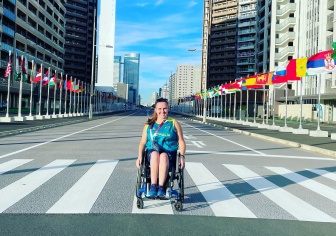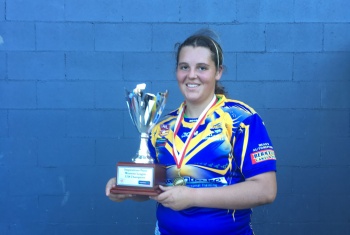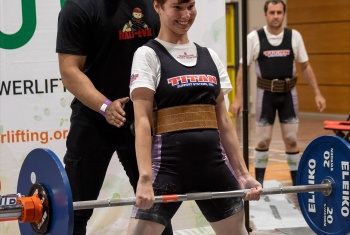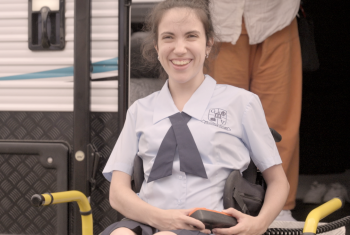Living the dream and looking ahead, the Tokyo experience has a potential Paris swansong on the horizon for dual-sport Paralympian, Hannah Dodd.
Returning from Tokyo, where her Australian Wheelchair Basketball team’s young core gained crucial experience, the NDIS participant said there wouldn’t be too much time to reflect.
“We were really happy to make it Tokyo, but we were affected by classification and COVID-19 (regulations),” Hannah said.
“We’ve got a shortened three-year cycle ahead (to Paris), and potential qualifiers for the Commonwealth Games and World Championships (in 2022).
“So, we’ll get back into training and look towards working our way back to podium. That’ll help me decide on Paris and we’ll reassess from there.
“But, there’s a bit of unfinished business.”
It’s that determination and dedication which has seen Hannah succeed. Now 29 and based on the Sunshine Coast, where she fine-tunes her elite wheelchair basketball abilities, it was on horseback where Hannah first made her mark.
Born with sacral agenesis and spina bifida, Hannah learnt to ride a horse before she could walk, leading to a distinguished equestrian career as Australia’s top-ranked competitor in her event and class.
Hannah represented Australia at the 2012 London Games in Grade IV Equestrian.
While bad luck struck with her horse “Kiwi” getting sick on the way to London and Hannah battling illness, the experience spurred her on.
“London was a dream I’d had since I was eight come true, but the outcome was disappointing,” Hannah said.
“I didn’t know what I was going to do when I got back to Australia, so I decided to give wheelchair basketball a go."
Hannah was set to move to the United States to play and study at The University of Alabama.
However, fate stepped in, with an opportunity to take up a scholarship at the University of the Sunshine Coast.
“I was actually recruited by Bridie (Kean), a dual Paralympian and former Gilders player” Hannah said.
“I studied Prosthetics and Orthotics and graduated last year, and I also met my partner who studies at USC also.”
Diagnosed with Peripheral Neuropathy at 16 and becoming an incomplete quadriplegic, Hannah has been using a wheelchair full-time since she was 22. She credits NDIS support as a key for her.
“I feel I’ve been really lucky with the NDIS; I’ve had some really great support coordinators, and I think for me, the main thing is the help I get at home,” Hannah said.
“The NDIS funding for the physiotherapy and chiro therapy is massive also. I experience pain frequently, so to have that support and treatment twice a week gets me ticking over.”
While Hannah’s sports chair is funded through her sponsor, Sunrise Medical, her day chair, plus maintenance to both are funded through her NDIS plan.
“I didn’t have NDIS access when I first moved to Queensland, and it was a lot harder to do things,” Hannah said.
“It makes a massive difference in my ability to be an athlete and maintain my quality of life.”
Whether Hannah sees the journey right through to Paris or not, exiting the spotlight as a dual-sport Paralympian is an honour to be held in the highest regard.
“London was one of the turning points in pushing the Paralympics, and the start of turning us from inspiration to just athlete, so, to have 24-hour coverage (in Tokyo) with such good viewership was awesome,” Hannah said.
“There’s been a really good shift away from that inspiration view, as we want to be regarded as athletes, and not an inspiration.”



